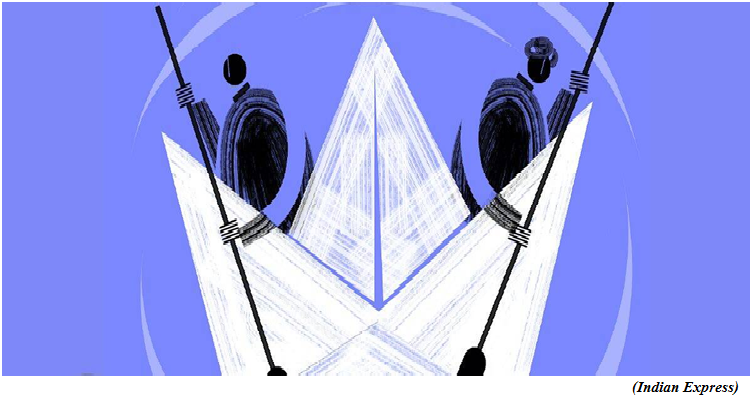Let Diplomacy Flow (GS Paper 2, International Relation)

Context:
- Recently, Pakistan Prime Minister expressed the desire for a diplomatic handshake from across the border.
- As of now, both countries have opted for diplomatic hedging. This attitude has framed the water diplomacy between the two countries as well.
- By raking up the issue of hydroelectric projects, Pakistan has reiterated its desire for third-party mediation while India has reinforced its call for revisiting the Indus Water Treaty (IWT).
Notice by India:
- In a recent notice to Pakistan via the Indus Commissioners, India claimed that the “intransigence” of Pakistan had made the communication channels over shared waters defunct.
- India has asserted that in light of this “material breach” of the agreement, it would like to “update the Treaty to incorporate the lessons learnt over the last 62 years”.
- It has given a 90-day notice; this has opened space, both legally and politically, for discussing, debating, interpreting and possibly also analysing the faultlines of water diplomacy of both countries.
Vienna Convention:
- Conversations on renegotiating and upgrading the IWT began a few years ago. In 2021, a parliamentary standing committee report suggested renegotiating the Treaty.
- Under Article 60 of the Vienna Convention on the Laws of the Treaties, a party can criticise an agreement and give notice of its intention to terminate it if the other party violates its fundamental provisions. India has adopted the moderate approach of not terminating but modifying the IWT.
Violation of Articles 8 and 9 of the IWT Treaty:
- India has attributed the “material breach” to Pakistan’s unilateral decision to approach the Permanent Court of Arbitration, bypassing the mandate of Indus Commissioners. The arbitration proceedings started on January 27. India boycotted this hearing.
- India claims that Pakistan has violated the dispute settlement mechanisms, as mandated by Articles 8 and 9 of the Treaty.
- Article 8 specifies the roles and responsibilities of the Permanent Indus Commission, a regular channel of communication for matters relating to the implementation of the Treaty. Article 9 is relevant for addressing any difference or dispute that might emerge between the two countries.
- Article 9 offers a graded pathway to address any issue related to the implementation or interpretation of the IWT, for instance, it provides for the appointment of a neutral expert in case there is a lack of consensus among the Commissioners.
- If the neutral expert believes that the difference should be treated as a dispute, it can be referred to the Court of Arbitration. However, it adds that the Commission has to report the facts to the two governments.
- The report must state the points of concord in the Commission, the views of each Commissioner on these issues and also mention the issues of disagreement. Only after receiving such a report can either of the governments address the issue bilaterally or through the Court of Arbitration.
Other Concerns:
- Pakistan was reluctant to discuss these issues under the Permanent Indus Commission from 2017-2022. The significance of the “material breach” and calls for terminating the Treaty should be seen in this context.
- However, any analysis of international diplomacy would be incomplete if it looks only at legal aspects. The practice of diplomacy and the use of law for explaining and justifying government actions are equally important.
- The reasoning put forward by India and Pakistan requires scrutiny. Ecological and economic concerns are also important to understand the diplomatic fault lines.
Case ofKishanganga& Ratle Project:
- The history of the Kishanganga Hydel Power Project, the Kishanganga is called Neelam in Pakistan is a case in point. In 2013, in a 52-page document, the Court of Arbitration gave a partial award on the project, upholding India’s right to divert water for the project.
- The Court refused to set a bar on the release of water, as demanded by Pakistan. However, it also restrained from making KHEP immune to environmental considerations. After the completion of the project, Pakistan objected to it again in 2014.
- Pakistan has also contested the Ratle project on the Chenab River on grounds of design and violations of the IWT. The project was delayed but work resumed on it in 2019.
- Meanwhile, Pakistan asked the World Bank to establish a Court of Arbitration to look into the project. The Bank has started a parallel process for appointing a neutral expert. India objected to this process, claiming it was a unilateral move.
Conclusion & Way Forward:
- Pakistan has shown a preference for third-party mediation, arguing that this could be the best route for overcoming the impasse in the relations between the two countries.
- India has seen Pakistan’s objection to the hydel projects as a tactic to delay them. Such positions are tantamount to diplomatic hedging.
- They are a reminder that technically-negotiated agreements are only partial solutions and can put incremental strains on Transboundary Rivers and their ecosystems for years. The two countries should use bilateral dispute settlement mechanisms to discuss the sustainable uses of water resources.
- Given the broad contours of the Indus Water Treaty, particularly Article 7 that talks about future cooperation, discussing and broadening transboundary governance issues in holistic terms could be the starting point for any potential diplomatic handshake.


